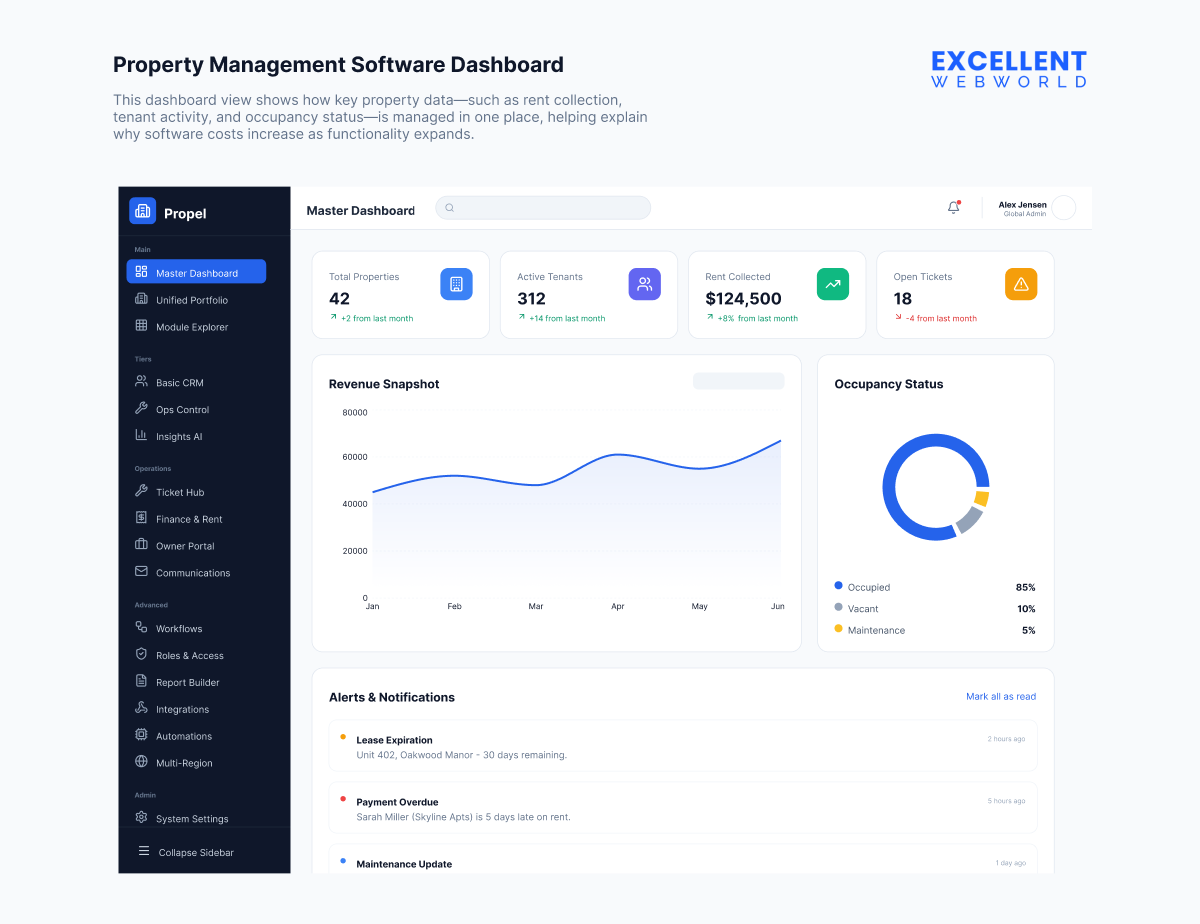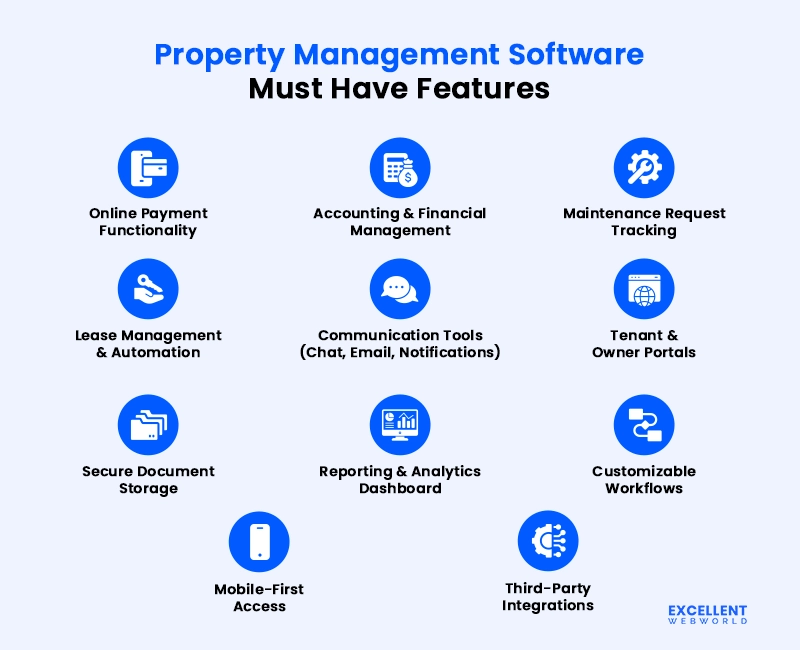When people search for the property management software cost, they often find very different numbers. Some software prices are as low as an annual streaming subscription. Others look more like a big business expense.
The reason? Pricing depends on how many units you manage, the tools you need, and whether you choose a ready-made system or build one from scratch.The cost of property management software is closely tied to how much functionality the system is expected to handle as operations grow.
This becomes clearer when you look at how such platforms are typically structured.

This difference in scale is exactly why pricing can vary so widely between individual landlords and property managers handling multiple units.
For a small landlord, the cost might just cover basics like rent collection and tenant screening. But larger portfolios often need advanced features such as accounting integrations, automation, and multi-property dashboards, pushing the software development cost higher.
Here’s a quick look at average cost of property management software in 2026:
| Tier | Ideal For | Typical Monthly Price Range (2026) | Key Features Included |
|---|---|---|---|
| Basic | Startups, Idea validation | USD 10,000 – USD 15,000 | Online rent collection, tenant screening, basic reporting |
| Mid-range | Medium portfolios | USD 15,000 – USD 25,000+ | Accounting tools, maintenance tracking, marketing listings |
| Enterprise | Large portfolios | USD 25,000 – USD 35,000+ | Advanced automation, custom integrations, multi-location support |
This overview shows how property management software prices scale with portfolio size and feature requirements. For a broader context on the industry, it’s helpful to consider some key Proptech statistics. In the next section, we’ll also explore what it costs to develop custom property & lease management software.
How Much Does Custom Property Management Software Development Cost in 2026?
When it comes to managing properties, businesses often reach a turning point: the ready-made tools on the market are simply not enough. That’s where custom property management software development becomes essential. Instead of being limited by generic features, custom software is built around your exact needs, whether it’s handling large-scale lease agreements, managing mixed-use properties, or integrating with smart building systems. The initial software project estimation is key to a successful build.
What Are the Estimated Cost Ranges for Developing Property Management Software?
| Property Management Software Type | Estimated Average Cost of Development (USD) | Time Frame |
|---|---|---|
| MVP (Minimum Viable Product) | 10,000 – 25,000+ | 2–3 months |
| Application-Level Custom Solution | 15,000 – 50,000+ | 3–4 months |
| Enterprise-Grade Platform | 60,000+ | 4–5+ months |
Why Should You Choose Custom Property Management Software Over Ready-Made Options?
Custom-built property management software isn’t just about having a branded dashboard. It’s about flexibility, control, and long-term efficiency. Many businesses evaluating building vs buying software often choose custom solutions because:
What Key Factors Drive Property Management Software Development Costs?
The property management software development cost depends on multiple factors:
The software development process itself has a profound impact on the total cost and project timeline, from initial planning to final deployment.
When Is It the Right Time to Invest in Custom Property Management Software?
Not every business needs to start big. In fact, many successful companies begin with a Minimum Viable Product, a lighter version of custom software that focuses on core features like rent collection, tenant management, and lease tracking. All of these are essential in the growing property management market, which is projected to reach over $42 billion by 2030.
Building an MVP for property management software (costing around 10,000–25,000 USD) allows you to test the market, refine your workflows, and reduce risk before investing in a full-scale platform.
You should consider full custom development when:
In short, while custom property management software prices are higher than standard tools, the investment pays off in control, scalability, and competitive edge—especially for enterprises managing multi-property portfolios. These benefits of custom software development are what justify the initial higher cost.
What Features Should You Add to Property Management Software for Maximum Value?
When it comes to rental property management software development, the real value lies in the features you include. A well-designed platform not only makes operations smooth but also ensures better tenant satisfaction and long-term growth.
As a software development consultant we recommend the following key features of a property management system that every real estate business should consider:
Another emerging trend is AI in real estate. AI can predict tenant behavior, automate rent reminders, suggest dynamic pricing for rentals, or even flag unusual payment patterns for fraud detection. When paired with IoT devices in smart buildings, AI makes building property management software even more efficient. For businesses looking for innovative real-estate business ideas, integrating AI is becoming a game-changer.
How Much Does Industry-Specific Property Management Software Cost?
Not every landlord or property owner needs the same type of software. The property management software cost often changes based on the type of real estate you manage, whether it’s a single-family home, a short-term rental, or a large commercial property.
Now, at first glance, ready-made SaaS tools look cheaper. But businesses often outgrow them. The problem is that SaaS platforms are built to serve the “average” landlord. If you need unique workflows, brand-specific features, or the ability to scale across multiple property types, you’ll eventually face limitations. That’s why you need custom property management software development.
With a custom build, you control the features, integrations, and scalability. Whether you need an apartment rental portal like Bayut or a short-term rental search app like Zumper, custom development ensures the system works exactly the way your business requires.
Here’s a breakdown of custom development costs by property type:
| Category | Key Features | Custom Development Cost (USD) |
|---|---|---|
| Small Landlords (1–10 units) | Rent tracking, tenant communication, lease storage | 12,000 – 14,000 |
| Single-Family Homes | Maintenance tracking, online payments | 14,000 – 16,000 |
| Apartment Complexes | Accounting, tenant portals, reporting tools | 16,000 – 18,000+ |
| Short-Term Rentals (Airbnb, Vrbo style) | Booking engine integration, dynamic pricing, and cleaning schedules | 20,000 – 40,000 |
| Hotels & Hospitality | Reservation systems, staff scheduling, guest management | 50,000 – 100,000+ |
| Commercial Property Owners | Lease analytics, facility management, IoT integrations | 80,000 – 120,000+ |
What Factors Most Influence the Property Management Software Costs?
The property management software cost is never one-size-fits-all. It depends on what type of real estate you manage, the level of complexity, and how scalable you need the solution to be. When building a custom platform, these are the key factors that shape development costs:
Why Is Excellent WebWorld the Best Choice for Property Management Software Development?
Understanding the cost of property management software development is key for businesses that want to grow efficiently and stay ahead in the future of real estate. Whether you’re comparing basic SaaS tools or planning a custom residential management system, the right investment is always less than the long-term losses from poor management or limited scalability.
At Excellent Webworld, we don’t just develop software; we craft intelligent, scalable, and business-ready marketplace platforms that help you move faster and grow smarter.
With 13+ years of experience, 900+ projects, and deep expertise of AI integration in software development, we help businesses develop property management software that is not only affordable but also future-proof.
Whether you’re planning an MVP or a feature-rich real estate solution, our team is here to guide you through every step, from idea to launch.
Let’s build something great together.
FAQs About Property Management Software Cost
Building a custom property management system typically costs between USD 10,000 to 60,000+, depending on the complexity of features, number of integrations, and scalability requirements.
The timeline usually ranges from 3 to 9 months. A simple MVP (Minimum Viable Product) may take around 3–4 months, while a full-featured, enterprise-grade system can extend beyond 9 months.
Yes. Custom-built solutions are designed to scale with your portfolio, adapt to unique workflows, and integrate advanced technologies (AI, IoT, CRMs, ERPs). Unlike generic tools, they give you long-term control, security, and efficiency.
Absolutely. Many startups begin with a basic MVP, covering essentials like rent collection, tenant management, and lease tracking—at a cost of around USD 10,000–25,000. This allows businesses to validate the idea, test the market, and expand features later.
On average, each feature or module can cost between USD 2,000 to 8,000, depending on its complexity, design requirements, and integration needs.

Article By
Mayur Panchal is the CTO of Excellent Webworld. With his skills and expertise, He stays updated with industry trends and utilizes his technical expertise to address problems faced by entrepreneurs and startup owners.




